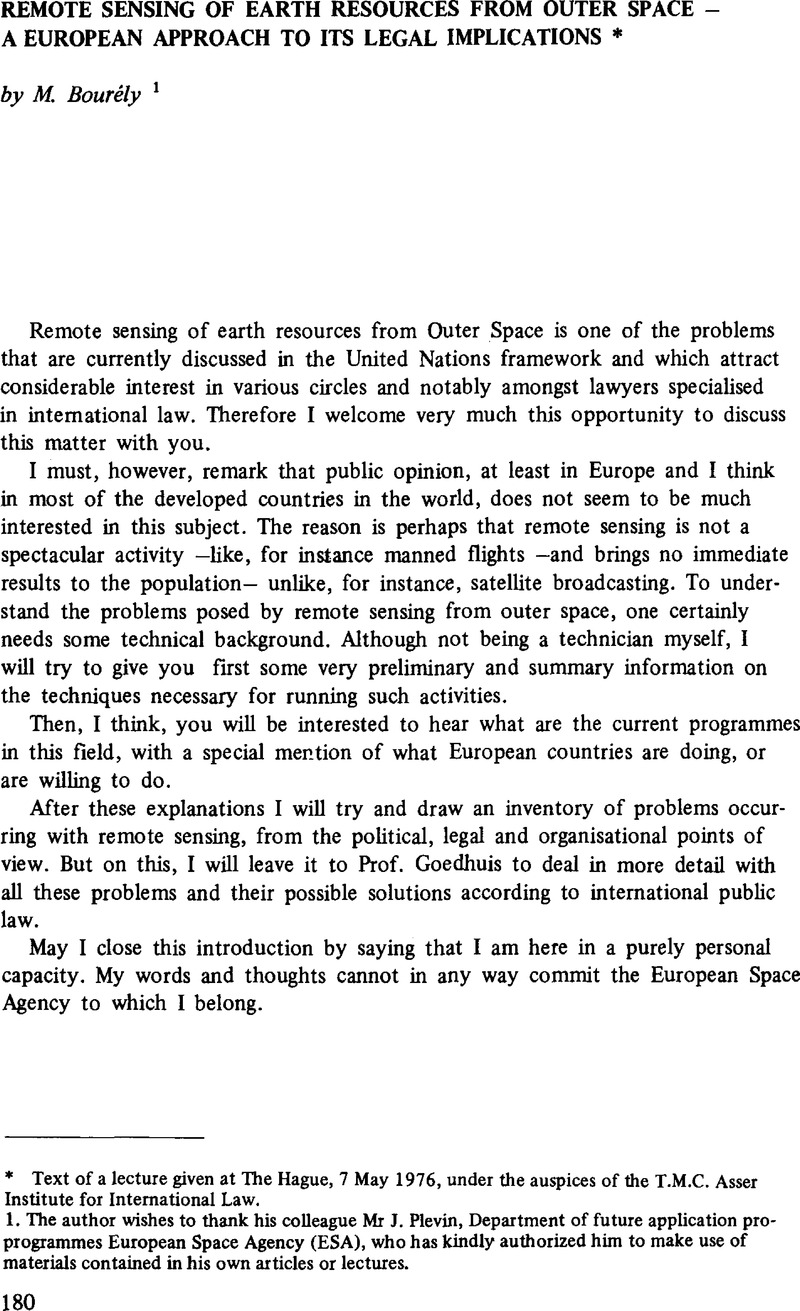Article contents
Remote Sensing of Earth Resources from Outer Space – A European Approach to its Legal Implications*
Published online by Cambridge University Press: 21 May 2009
Abstract

- Type
- Articles
- Information
- Copyright
- Copyright © T.M.C. Asser Press 1976
References
2. See Galloway, Eilene, Remote sensing from outer space: legal implications of worldwide utilisation and dissemination of data in: Proceedings of the Symposium held at Institute of Air and Space Law (Montreal, 10 1975), Sijthoff, Leyden 1976.Google Scholar
3. See replies by the European countries to the UN Secretary General's questionnaire on remote sensing (A/AC.105/C.1/WG4/211). See also the reports by European countries to the UN on their national space programmes or space programmes based on international cooperation for 1974 (A/AC.l 05/146 and addenda 1 to 4); and ESA Directory of European Activities in the Remote Sensing of Earth Resources (Ref. ESRO/JPPC (73)20, add. 1, May 1973).
4. Norway and Portugal, which are not members of ESRO/ESA, stated in their replies that they have participated in the NASA ERTS experiment.
5. The European Space Research Organisation (ESRO) was established by a Convention signed in Paris on 14 June 1962 by the Federal Republic of Germany, Belgium, Denmark, Spain, France, Italy, The Netherlands, the United Kingdom of Great Britain and Northern Ireland, Sweden and Switzerland. Before this Convention entered into force, on 20 May 1964, a Preparatory Space Research Commission (COPERS) established by an international agreement signed at Meyrin (Switzerland) on 1 December 1960 made the necessary preparations for ESRO. Following the decisions taken by the European Space Conference (ESC), a Convention for the Establishment of a European Space Agency (ESA) was signed on 30 May 1975. The object of this Convention is to merge the European space institutions in the new ESA, which will come into being when the Convention of 30 May 1975 comes into effect. This Convention has been signed by the ten ESRO members and Ireland. At present ESRO is continuing its activities on the basis of the Convention of 14 June 1962, but the Council of the Organisation has decided to change its name immediately to “European Space Agency”.
6. See the reply by the Economic Commission for Europe (ECE) to the questionnaire by the UN Secretary General on the assistance which developing countries need with regard to the practical applications of space techniques: “As its programme of work deals with none of the activities covered by the report, the ECE has no comment to make on this subject” (A/AC.105/143, Add.1).
7. Treaty on Principles governing the activities of States in the Exploration and Use of Outer Space, including the Moon and other Celestial Bodies; 1967.
8. This principle is contained in revised UN Resolutions, notably 626 (VII) 21 December 1952; 1314 (XIII) 12 December 1958; 1803 (XVII) 14 December 1962; 2158 (XXI) 25 November 1966; 2600 (XXIV) 15 December 1969; 2962 (XXV).
9. UN Document: Report of Legal Sub-committee A/AC.105/147.
- 1
- Cited by


